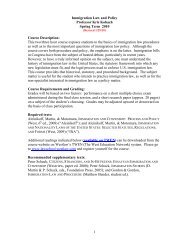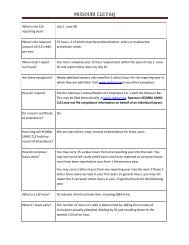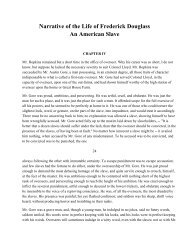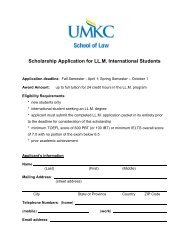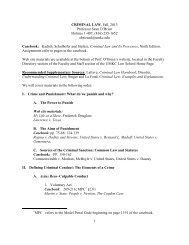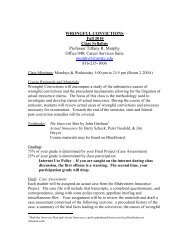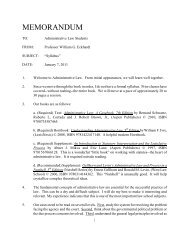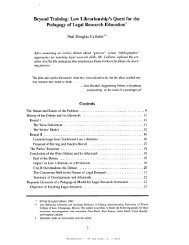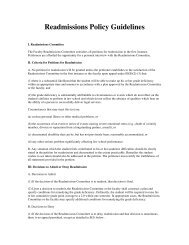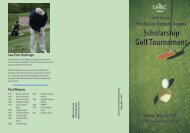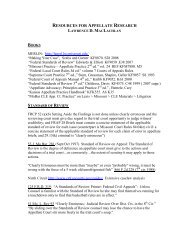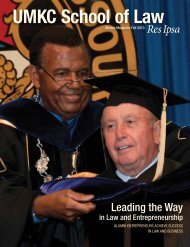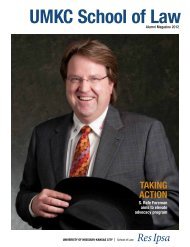1. Preamble 2. Definitions 3. Violations - UMKC School of Law
1. Preamble 2. Definitions 3. Violations - UMKC School of Law
1. Preamble 2. Definitions 3. Violations - UMKC School of Law
- No tags were found...
Create successful ePaper yourself
Turn your PDF publications into a flip-book with our unique Google optimized e-Paper software.
<strong>1.</strong> <strong>Preamble</strong>We, the students at the University <strong>of</strong> Missouri - Kansas City <strong>School</strong> <strong>of</strong> <strong>Law</strong>, recognizing that the recordedevaluation <strong>of</strong> our academic pursuits must reflect the products <strong>of</strong> intelligence guided by integrity, do herebyestablish this Honor Code so that all who may inquire can be assured that our individual accomplishmentswere honestly achieved; and so all who achieve may welcome inquiry. Wherefore we pledge ourselves,each and all, to careers founded in integrity and to the enforcement <strong>of</strong> the standards herein defined. Eachstudent shall have the affirmative duty <strong>of</strong> assisting in the implementation <strong>of</strong> this Code.<strong>2.</strong> <strong>Definitions</strong>.01 Academic Matter. All examinations, writing assignments, and programs or activities (such as MootCourt, <strong>Law</strong> Review or Urban <strong>Law</strong>yer) which in any manner affect or result in a <strong>Law</strong> <strong>School</strong> grade orsatisfaction <strong>of</strong> a requirement for graduation..02 Accused. Student who is the subject <strong>of</strong> a hearing on an Honor Code violation..03 Class. Group <strong>of</strong> students, based on year in <strong>Law</strong> <strong>School</strong> and academic progress. For the purposes <strong>of</strong> thiscode, those who are in their post third-year or are working on advanced degrees, shall be deemed third-yearstudents..04 Gender. Any use <strong>of</strong> grammatical gender reference shall be interpreted as applying equally to males andfemales..05 Matter Relating to Academic Credentials. Any representation made to any person concerning academicachievements or performance in <strong>Law</strong> <strong>School</strong> sponsored programs affecting a requirement for graduation..06 SBA President. President <strong>of</strong> the Student Bar Association..07 Student. A student (as defined in 200.020.B.8. <strong>of</strong> the University's Collected Rules and Regulations) atthe University <strong>of</strong> Missouri-Kansas City <strong>School</strong> <strong>of</strong> <strong>Law</strong>..08 Unauthorized Sources. All written material and persons except as otherwise authorized by theinstructor.<strong>3.</strong> <strong>Violations</strong>.01 Jurisdiction. Any conduct by a student that tends to gain or give an unfair advantage for any student inany academic matter or in any matter relating to academic credentials is considered unethical and aviolation <strong>of</strong> the Code. It shall not be necessary for the Prosecutor to prove that any advantage was, in fact,achieved. Any conduct by a student impeding the fair operation <strong>of</strong> this Code is also a violation <strong>of</strong> thisCode..02 Specific <strong>Violations</strong>. Prohibitions <strong>of</strong> the Code include, but are not limited to, the following:a) During an examination, no student shall have, consult, give to another, receive from another, or solicitfrom another any information or material unless specifically authorized by the instructor.b) No student shall knowingly convey, directly or indirectly, to another student any information about thecontents <strong>of</strong> an examination that the other student has yet to take.c) No student, with the intent to improve his or her grade, shall convey to an instructor any information thattends to identify his or her authorship <strong>of</strong> an examination yet to be graded.d) No student shall work on his or her examination other than during the time prescribed, nor in a roomother than one designated for the taking <strong>of</strong> the examination.e) For any assignment that counts toward a grade or is required for graduation, no student shall consultunauthorized sources <strong>of</strong> information.
The Student Prosecutor shall be a third-year student. The Assistant Student Prosecutor shall be a secondyearstudent..02 Appointment and Term <strong>of</strong> Office:a) Justices. One first-year justice, one first-year alternate justice, one second-year justice, and onesecondyearalternate justice will be selected by the SBA President on the basis <strong>of</strong> applications submitted to him orher. The selection will be made at the first SBA meeting <strong>of</strong> the fall semester that includes the first-yearrepresentatives.Justices will serve three one-year terms unless they re- sign, graduate, are removed for cause or becomeother- wise ineligible. Justices who graduate may serve until the first-year justices are appointed.Justices seated at the time this Code becomes effective are deemed to have been appointed in accordancewith this section.b) Prosecutor. The student prosecutor shall be the person who was the assistant student prosecutor duringthe previous academic year, provided, however, that if that person is no longer eligible, the SBA Presidentshall select a student prosecutor. The selection <strong>of</strong> the assistant student prosecutor shall be made by the SBAPresident before the end <strong>of</strong> winter semester classes. Selections shall be made on the basis <strong>of</strong> the designee'sclass for the following year.The Prosecutor's term <strong>of</strong> <strong>of</strong>fice shall begin on the first day <strong>of</strong> the summer session, provided, however, thatcases arising before or during the winter semester final examination period shall be conducted by wintersemester <strong>of</strong>fice-holders..03 Forfeiture <strong>of</strong> Office for Cause. A student is ineligible to continue as a Justice, Prosecutor or an alternateif he or she is placed on academic or disciplinary probation, or if for any other reason his or hercontinuation in <strong>of</strong>fice may not be in the best interest <strong>of</strong> the <strong>School</strong> <strong>of</strong> <strong>Law</strong> as determined by the Board <strong>of</strong>Governors..04 Disqualified from Duty. Justices or Prosecutors shall disqualify themselves from performing theirduties when they feel that they cannot impartially perform those duties. The accused can raise or suggestgrounds for such disqualification <strong>of</strong> a justice. The failure <strong>of</strong> Justices to disqualify themselves may be raisedon appeal as a possible abuse <strong>of</strong> discretion.Disqualification <strong>of</strong> a Justice or Prosecutor creates a temporary vacancy and shall be filled pursuant to5.05(b)..05 Vacancies.a) Permanent Vacancies. If by graduation, or for any other reason, a permanent vacancy occurs during anormal term <strong>of</strong> <strong>of</strong>fice, such vacancy shall be filled in a manner consistent with 5.0<strong>1.</strong> If for any reason avacancy is not filled when needed, it may be treated as a temporary vacancy and filled as prescribed.5.05(b).b) Temporary Vacancies. Vacancies that are created when a student is unavailable, disqualifies him orherself or the Court sustains a challenge for cause, shall be filled by the SBA President who shall ask thealternate from the same class to serve. If the alternate is not available, the SBA President shall selectanother member <strong>of</strong> the class who is not ineligible to serve.6. Violation and Investigation Reports.01 Reports Made. Any person may report a suspected violation <strong>of</strong> the Honor Code. Reports may be madeto either the SBA President or to the Associate Dean.If reported to the SBA President, the SBA President shall notify the Associate Dean <strong>of</strong> the report <strong>of</strong> asuspected violation as soon as possible..02 When Made. Reports <strong>of</strong> suspected Honor Code violations must be made within 45 days <strong>of</strong> thediscovery <strong>of</strong> the suspected violation.
.03 Informal Disposition or Submission <strong>of</strong> Case to Student Prosecutor. The Associate Dean shall have theauthority to investigate the reported suspected violation <strong>of</strong> the Honor Code before initiating formaldisciplinary procedures and give the student the opportunity to present his/her personal version <strong>of</strong> theincident or occurrence. After doing so, the Associate Dean may, for good cause shown, informally dispose<strong>of</strong> the case, and, after explaining to the student the various options available, shall fix a reasonable timewithin which the student suspected to have violated the Honor Code shall accept or reject a proposedinformal disposition. If no informal disposition is deemed appropriate by the Associate Dean or the studentrejects a proposed informal disposition, the Associate Dean shall notify the student prosecutor <strong>of</strong> the report<strong>of</strong> a suspected violation <strong>of</strong> the Honor Code. Should the Prosecutor disqualify him or herself pursuant to5.04, the SBA President shall fill the temporary vacancy pursuant to 5.05(b). Any statements made by thestudent suspected <strong>of</strong> violating the Honor Code to the Associate Dean in the course <strong>of</strong> the informaldisposition process shall not be communicated to the student prosecutor or be admissible against thestudent in subsequent Honor Court proceedings..04 Investigation by the Prosecutor. Upon notification by the Associate Dean <strong>of</strong> the report <strong>of</strong> a suspectedviolation <strong>of</strong> the Honor Code, the Prosecutor shall conduct an investigation.Any student called upon to supply information relevant to the investigation, other than the accused, shallcomply as fully as possible.At the completion <strong>of</strong> the investigation, if the Prosecutor feels the evidence is insufficient to justifyprosecution.The Prosecutor shall so notify the SBA President and the Associate Dean, and with their concurrence thecase may be dropped.If the Prosecutor determines that probable cause exists to prosecute a person for a violation <strong>of</strong> the HonorCode, he or she shall send notice <strong>of</strong> this finding to the Associate Dean <strong>of</strong> the <strong>Law</strong> <strong>School</strong>..05 Submission <strong>of</strong> Case to Grand Jury.a) Upon notice that the Prosecutor has determined that probable cause exists to prosecute a person for aviolation <strong>of</strong> the Honor Code, the Associate Dean shall con- convene a grand jury hearing.b) The Associate Dean shall select six names at random from the <strong>Law</strong> <strong>School</strong> student body. The AssociateDean shall summon the people selected to attend a meeting with himself and the SBA President. At thismeeting the Associate Dean shall inform the students selected that the first three qualified students selectedwill be required to serve on a grand jury to determine whether or not probable cause exists to believe theHonor Code has been violated. The Associate Dean may excuse any grand juror for cause and replace thatgrand juror with an alternate. The Associate Dean shall inform the grand jury <strong>of</strong> their membership on thegrand jury and all grand jury proceedings are confidential. The SBA President and the grand jurors shallselect a date, time and place for the grand jury proceeding, providing that the selection <strong>of</strong> such a date willnot unreasonably delay the Honor Court proceedings. The SBA President shall inform the Chief Justice andthe Prosecutor <strong>of</strong> the date <strong>of</strong> the hearing.c) The Prosecutor shall have the duty <strong>of</strong> providing the Chief Justice with a copy <strong>of</strong> the items <strong>of</strong> evidencethat form the basis for his or her determination that probable cause exists to prosecute for a violation <strong>of</strong> thisHonor Code. The copies provided by the Prosecutor to the Chief Justice shall have all identifyingcharacteristics removed except as necessary to establish probable cause that a violation <strong>of</strong> this Code hasbeen committed. The Prosecutor shall place a copy <strong>of</strong> these items <strong>of</strong> evidence and a summary <strong>of</strong> why he orshe believes probable cause exists in a signed and sealed envelope. The envelope <strong>of</strong> evidence shall bedelivered to the Chief Justice before the grand jury proceeding. If the suspected violation is plagiarism, theProsecutor shall provide the Chief Justice with the original sources that the grand jury needs to adequatelyevaluate the evidence provided in the packet. The Chief Justice shall make arrangements to provide thegrand jury with the source material. This packet shall also contain a form for the grand jury to report itsfindings.The investigative power <strong>of</strong> the grand jury is strictly limited to the evidence presented by the Prosecutor.The grand jury shall not independently investigate the matter. The grand jury may submit written questionsto the prosecutor through the Chief Justice.
d) The Chief Justice <strong>of</strong> the Honor Court will initiate the grand jury proceeding by informing the grand jurythat the grand jury proceedings are to be confidential. The Chief Justice should elicit from the grand jurorssigned statements that the grand jurors understand fully the duty <strong>of</strong> confidentiality. The Chief Justice shalladvise the students that the information presented to the grand jury will be known only to the studentprosecutor and them- selves and that a breach <strong>of</strong> confidentiality may be an Honor Code violation.e) After the Chief Justice has fulfilled the obligations imposed by section (d), he or she should give thegrand jury the sealed envelope provided by the Prosecutor containing the evidence and remove him orherself from the grand jury proceedings.f) After the Chief Justice has left the grand jury room, the grand jury will break the seal on the evidenceenvelope and examine the contents. The grand jury shall examine the evidence and determine whetherprobable cause exists for finding a violation <strong>of</strong> this Code. A decision shall be made within a reasonableperiod <strong>of</strong> time, not to exceed ten (10) days.g) The finding <strong>of</strong> probable cause or the lack <strong>of</strong> probable cause will be determined by a majority vote <strong>of</strong> thegrand jurors. This vote is binding on all members <strong>of</strong> the grand jury.h) After the grand jury has reached a decision. it shall record that decision on the form provided for suchpurpose in the envelope described in 6.04(c) and sign it. The evidence shall be returned to the envelopeprovided by the Prosecutor, sealed, and signed. The envelope shall be delivered to the Chief Justice in aplace and manner prescribed by the Chief Justice.i) The Chief Justice shall deliver the envelope with the grand jury finding to the Associate Dean. TheAssociate Dean shall break the seal on the envelope in the presence <strong>of</strong> the Prosecutor who shall verify thatthe envelope contains all the items <strong>of</strong> evidence the Prosecutor originally placed in the envelope.j) The Associate Dean shall reveal the finding <strong>of</strong> the grand jury only in furtherance <strong>of</strong> the procedures <strong>of</strong> thisHonor Code and then only to the necessary parties..06 Hearing Date and Notice. A hearing shall be held as soon as possible after the grand jury hasdetermined that there is probable cause to believe the accused has violated the Honor Code. In no case shallmore than 45 days elapse between the suspected violation report and the hearing, unless a later date isagreed upon by the Prosecutor and the student charged.The student shall be notified <strong>of</strong> a hearing in writing by the Chief Justice. The notice shall set forth the date,time and place <strong>of</strong> the alleged violation, the conduct to be inquired into, and the date, time, and place <strong>of</strong>hearing before the Honor Court. The notice shall be given at least seven (7) days in advance <strong>of</strong> thescheduled date <strong>of</strong> the hearing, unless a shorter time be fixed for good cause.7. Hearing Procedure.01 Confidentiality. Honor Court hearings shall be closed to the public unless theaccused requests a public hearing, in which case one shall be provided. An audio recording shall be made<strong>of</strong> the proceeding and shall become part <strong>of</strong> the record..02 Ex Parte Communication. Except as to procedural matters, there shall be no ex parte communicationwith any Justice by the Prosecutor, by defense counsel or by the accused..03 Pre-Trial Motions. All pre-trial motions, including motions in limine, shall be in writing and given tothe Chief Justice at least four days prior to the hearing. The Court may set a time limit on hearing pre-trialmotions. The Court shall hear pre-trial motions no later than the day before the trial..04 Evidence. A student defendant or prosecutor appearing before the Honor Court shall have the right topresent any evidence by witness or affidavit relating to any charge or defense. The formal rules <strong>of</strong> evidenceshall not apply and the Court may consider relevant testimony <strong>of</strong> witnesses, affidavits, written reports, andany other relevant evidence..05 Witnesses. At least two (2) days in advance <strong>of</strong> the scheduled date <strong>of</strong> the hearing, witnesses shall benotified by the party calling them <strong>of</strong> their obligation to appear. Witnesses shall bring with them whateverdocumentation is requested. Failure <strong>of</strong> a student witness to appear, without good cause, is a violation <strong>of</strong> thisCode.
The Prosecutor may not call the defendant as a witness. The defendant may elect to testify or not, as he orshe chooses. No unfavorable inference may be drawn should the defendant choose not to testify..06 The Court. The Chief Justice shall preside at the hearing. The Prosecutor shall present the case againstthe accused. The accused may represent him or herself or may be represented by an adviser or legalcounsel..07 The Hearing. The Prosecutor shall make an opening statement and present the evidence against theaccused. The Accused or his or her representative may elect to make an opening statement either at theconclusion <strong>of</strong> the Prosecutor's opening or after the Prosecution’s evidence has been presented. At theconclusion <strong>of</strong> the Prosecution's case-in-chief, the accused may present his or her evidence.Each party shall have the right to cross-examine the opposing party's witnesses. Either party may presentfurther rebuttal evidence when, in the discretion <strong>of</strong> the Chief Justice such evidence is relevant and will notunduly delay the proceedings. After all evidence has been presented, the Prosecutor may make a closingargument, if so elected, the Prosecutor may present a rebuttal..08 Court's Decision. The Court shall promptly deliberate and make its findings and determinations inexecutive session. If seventy-five percent (75%) <strong>of</strong> the members <strong>of</strong> the court find by clear and convincingevidence that the accused has committed the violations charged, it shall recommend to the Dean one ormore <strong>of</strong> the sanctions prescribed in 8.02, subject to the mitigating circumstances exception in 8.0<strong>3.</strong>If at all possible, the Court shall render a decision immediately following its deliberations. In no event shallits decision be announced later than three (3) days following the conclusion <strong>of</strong> the hearing. An oralpresentation <strong>of</strong> the Court's findings and recommendations is permitted following the hearing, but a writtenreport including findings <strong>of</strong> facts, conclusions and recommended disposition shall be filed within one weekafter conclusion <strong>of</strong> the hearing. Concurring or dissenting opinions may be filed according to the sameterms.The report <strong>of</strong> the Court, including any concurring or dissenting opinions, and the entire record <strong>of</strong> theproceedings shall be submitted to the Dean and the accused as soon as possible after issuance..09 Procedural Questions. Procedural questions arising during the course <strong>of</strong> proceedings that are notcovered by these rules shall be resolved by the Chief Justice. All objections concerning procedure shall bemade/raised in writing to the Chief Justice. The Chief Justice shall answer all objections in writing andforward both the objection and the decision to both the Prosecutor and defense counsel and to all otherjustices sitting on the Court for that hearing.The decision <strong>of</strong> the Chief Justice on a procedural question may be challenged by the accused, theprosecutor, or a sitting member <strong>of</strong> the Court. The Chief Justice shall present any challenge to the sittingCourt and the ruling <strong>of</strong> the majority <strong>of</strong> the Court shall be final. There shall be a form, prepared by the ChiefJustice, for appealing a procedural decision. The party challenging the decision shall complete the form andforward a copy to all sitting justices. All such challenges must be made on a timely basis..10 Review <strong>of</strong> Record by Dean. Upon receipt <strong>of</strong> the Court's report, the Dean will, within a reasonableamount <strong>of</strong> time, review the entire record, including the Court's findings <strong>of</strong> facts, conclusions andrecommendations and render a decision in the case.The Dean may remand for further consideration <strong>of</strong> specific issues. A decision by the Dean to remand shallinclude a list <strong>of</strong> questions for the Court. The Court shall then respond in writing within fourteen (14)calendar days. The Dean may not reverse a finding <strong>of</strong> not guilty by the Court.The Dean's decision shall be transmitted in writing to the accused and to the Chief Justice <strong>of</strong> the HonorCourt. Where the accused has been found guilty by the Court, a copy <strong>of</strong> the Dean's decision will be placedin the student's <strong>of</strong>ficial file.8. Sanctions.01 Report <strong>of</strong> Misconduct. Where a finding that the accused has violated the Code has been made, themisconduct may be called to the attention <strong>of</strong> the proper University authorities, Bar authorities or any otheraffected parties for appropriate action.
.02 Sanctions. The following sanctions may be recommended by the Court to the Dean and imposed by theDean:a) Expulsion. Permanent separation <strong>of</strong> the student from the <strong>School</strong> <strong>of</strong> <strong>Law</strong>.b) Dismissal. An involuntary separation <strong>of</strong> the student from the <strong>School</strong> <strong>of</strong> <strong>Law</strong>. It does not imply or state aminimum separation time.c) Suspension. Separation <strong>of</strong> the student from the <strong>School</strong> <strong>of</strong> <strong>Law</strong> for a definite period <strong>of</strong> time, after whichthe student is eligible to return. Conditions for readmission may be specified.d) Probation. Disciplinary probation, subject to any appropriate terms or conditions.e) Reprimand. Written or oral reprimand..03 Mitigating Circumstances. When considering a recommended sanction upon finding that a violation hasoccurred, the Court may consider mitigating circumstances such as, but not limited to, any physical,mental, financial, or emotional problems <strong>of</strong> the accused. If the severity <strong>of</strong> mitigating circumstancesrequires, the Court may recommend no sanction be levied on the accused, even though a violation hasoccurred.If the Court considers mitigating circumstances when recommending a sanction, the written report <strong>of</strong> theCourt shall include a full explanation there<strong>of</strong>.9. Appeals.01 Right to Petition for Review (other than dismissal or suspension). In all cases where the disciplineimposed by the Dean is other than dismissal or suspension, the accused may petition the Chancellor inwriting for a review <strong>of</strong> the decision within ten (10) consecutive calendar days after notification. A copy <strong>of</strong>the Petition for Review must also be served upon the Dean within such time. The Petition for Review shallstate the grounds or reasons for review, and the Dean may answer the petition within ten (10) consecutivecalendar days if he or she so desires.The Chancellor or his or her designated representative may grant or refuse the right <strong>of</strong> review. In all caseswhere the Petition for Review is refused, the decision shall be final. If the Chancellor or representativereviews the decision, the action <strong>of</strong> the Chancellor shall be final unless it be to remand the matter for furtherproceedings..02 Right <strong>of</strong> Appeal (dismissal or suspension only). When a student is dismissed or suspended from theUniversity for an Honor Code violation by the Dean, the student may appeal such decision to theChancellor within twenty (20) consecutive days after notification <strong>of</strong> the decision <strong>of</strong> the Dean. A copy <strong>of</strong> thenotice <strong>of</strong> appeal will contemporaneously be given by the student to the Dean. The student may file a writtenmemorandum for consideration by the Chancellor with the notice <strong>of</strong> appeal, and the Chancellor mayrequest a reply to such memorandum by the appropriate party. The Chancellor or his/her designee shallreview the full record <strong>of</strong> the case and the appeal documents and may affirm, reverse, or remand the case forfurther proceedings and shall notify the Dean and the student in writing <strong>of</strong> the decision on the appeal. Theaction <strong>of</strong> the Chancellor shall be final unless it be to remand the matter for further proceedings..03 Status During Appeal. In the cases <strong>of</strong> suspension or dismissal where a notice <strong>of</strong> appeal is filed withinthe required time, a student may petition the Chancellor in writing for permission to attend classes pendingfinal determination <strong>of</strong> appeal. The Chancellor may permit a student to continue in school under suchconditions as may be designated pending completion <strong>of</strong> appellate procedures, provided such continuancewill not seriously disrupt the University or constitute a danger to the health, safety or welfare <strong>of</strong> theUniversity community. In such event, however, any final disciplinary action imposed shall be effectivefrom the date <strong>of</strong> the action <strong>of</strong> the Dean.10. Advisory Opinions.01 When required to do so, the Court may render advisory opinions on matters relating to the application<strong>of</strong> the Code..02 A box shall be located in a public area <strong>of</strong> the <strong>Law</strong> <strong>School</strong> for the purpose <strong>of</strong> receiving written requests
y students <strong>of</strong> the <strong>Law</strong> <strong>School</strong> for advisory opinions..03 The Honor Court shall submit its advisory opinion, in writing, to the Dean and the SBA President..04 The Dean, within a reasonable time, shall respond to the advisory opinion..05 The advisory opinion and the Dean's response shall be appropriately posted and made available to thestudents in the library..06 Conduct consistent with an advisory opinion shall be presumed not to be in violation <strong>of</strong> the Code.1<strong>1.</strong> Amendments.01 Amendments to the Honor Code may be proposed by petition <strong>of</strong> any ten (10) students, by the Board <strong>of</strong>Governors <strong>of</strong> the Student Bar Association on its own motion, or by petition <strong>of</strong> a majority <strong>of</strong> the HonorCourt..02 A proposed amendment shall be adopted if at the adoption election at least two-thirds (2/3) <strong>of</strong> thestudents voting shall vote favoring the proposed amendment.1<strong>2.</strong>AdoptionThis Honor Code shall be in effect when approved by a two-thirds vote <strong>of</strong> the students voting, by the Dean<strong>of</strong> the <strong>School</strong> <strong>of</strong> <strong>Law</strong>, the Chancellor, and by the Board <strong>of</strong> Curators.



